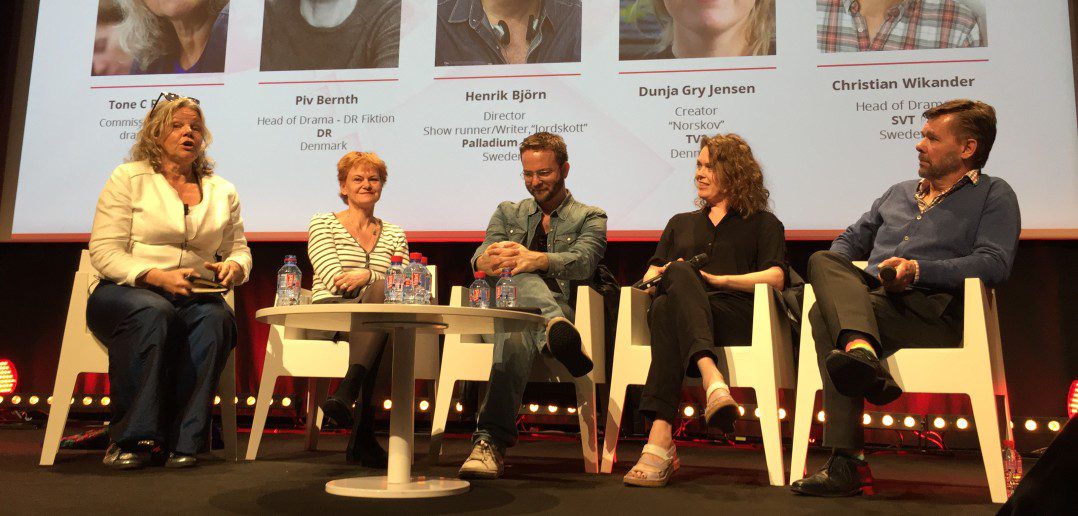What is the secret storytelling sauce in the Nordic region that has seen its TV dramas travel the world in recent years? A panel of experts gave their first-hand experiences at MIPTV this afternoon, as part of a slate of Nordic-themed sessions.
The panel comprised Piv Bernth, head of drama – DR Fiktion at DR in Denmark; Henrik Björn, director, show runner and writer of hotly-tipped series Jordskott, from Palladium Film in Sweden; Dunja Gry Jensen, creator of Danish show Norskov; and Christian Wikander, head of drama at SVT in Sweden. The moderator was Tone C Rønning, commissioning editor of independent drama at NRK in Norway.
What helps and what hinders the success of these dramas? Starting with the hindrances. Bernth started her answer in Danish to prove a point. « The language! That is a big obstacle for us, because of course co-production is not attractive when as a public service broadcaster we need to focus on the Danish audience, so we have to produce our series in Danish, » she said. « English-spoken series are much easier to get around the world, but we are still fighting, and the world is going our way: more and more people are getting used to reading subtitles. »
She noted that she has a budget that allows her to plan for four years ahead, which she sees as a big advantage. « But I could easily use more co-production money and more budgets, » she admitted, while stressing that focusing on quality solves a lot of the problems that DR encounters.
Björn talked about the obstacles as a director and writer. « To get any TV show on air is full of obstacles, » he admitted. He’d worked in film for 20 years, but Jordskott was his first TV drama. « We really needed to convince: it’s not just about a good idea: I also have to convince you that we can film top-quality. So we did a test, » he said. « The two years of development was also a field of obstacles. It was almost like the computer game when you come to a different level and meet the worst boss! That was good, because it kept us focused on the target all the time. »
He was capable of standing his ground when challenged by the broadcaster along that way. « If they want me, they must listen to me! » he said. Wikander (the broadcaster in question) chimed in, talking about the pilot and test phase. « You came with 10 minutes. And for a company with no track record on the drama side, that was really a key to us listening, »he said to Björn.
« It’s so seldom that we show instead of tell. We base so many of our decisions on the script, on the text. But reading any scene… if we were all to read the same scene, we’d all have different pictures in our head. It’s odd that we are so seldom in the development process moving into showing something. »
Jensen talked about her show Norskov, which is being produced for TV2 in Denmark. She admitted that as a writer, she didn’t show anybody a pilot, so faced the challenge of making people see what she was seeing in her head. « Being a screenwriter is the hardest of all! » she said. « It’s because everything is abstract. When you’re writing it’s all abstract: the characters, the way they’re talking, the room. Everything is abstract. Being somewhere where it starts to be concrete and manifest, that’s a wonderful place. »
She added that some of the success in Denmark comes from the fact that DR is a public service channel, so needs to target a broad audience. « And for many years there’s been this great trust in the creative people: they call it the One Vision method, » she said. And she noted that the head of drama at the other channel, TV2, worked under that system too, so is now using that approach in the commercial channel to strengthen its drama. « The problem is that they cannot plan so far ahead. DR has a budget of four years, so they can plan ahead. That’s not the case with TV2: we have to air the show before they can decide whether they want to make another season. »
Bernth helped to develop that One Vision approach as a producer within DR, and said it’s vital for new writers to move forward: « Don’t look back at what we did – smash Borgen and The Killing, and forget about it! » she said. « You always have to move on and develop the way you tell the stories, and trying to renew it… If you have success and just do the same thing again and again, you will tire yourself, and the audience. That’s why procedurals suddenly got boring… That’s why we did The Killing: we have to do a long story, we have to tease the audience and we have to challenge them… The key point is to keep trying to find new ways of telling stories, and find the good stories and the important stories. »
She said DR tries hard to get in young writing talent « because we have a lot of experience to offer… so they can easily go forward and do things ». That process of renewal again.
Wikander talked about SVT’s approach. « We make 10-11 titles per year in different formats, » he said. « In order to develop new talent, I very much envy the Danish film school which has managed to feed the need of new talent. For us we are slowly getting that engine going now, but besides that we have the shorter series that we make for the web… but still it is hard to go from those low-cost productions and find yourself a writer on The Bridge. » But those online stories are where SVT tries to foster its new writing talent.
« There’s also a strong element of ‘master teaching’, » said Jensen, who started off working as a writer for more experienced people. « I see it as a duty to take on some young writers, and of course it’s a great energy to have in the room sometimes. You learn from the people who’ve done it before, and hopefully eventually you find your own way to do it, » she said.
« There is no such thing as not sharing, when you are in the writers’ room together for two years and you have to work in these 10 square metres, 10 hours a day, five or six days a week, there’s no such thing as being secretive! » said Bernth. And Björn said he almost casted his scriptwriters like he would actors, meeting a lot of people and looking for the right chemistry.
Wikander talked about SVT’s role in Jordskott. « You were very very open for feedback, very open to bring in the best competencies into the room. It’s always difficult to give feedback, that being the big channel you will destroy the vision. And that gets even more obvious when you talk to a company that hasn’t really done it before, » he said, addressing Björn. « You could be very precise and quite harsh in feedback always knowing that Henrik could really stand up and say ‘yes, a brilliant idea, but it has nothing to do with Jordskott’. This is the two perspectives of a co-operation. Both sides feel respect and ability to listen, but also stands up for the vision. »
Björn compared broadcasters to brands. « When I do an advertisement, the feedback is more like ‘do it, or you’ll never work again!’. When we work with SVT, the feedback is more a suggestion… so there is a difference! »
Bernth was asked if there is room to make mistakes within DR. « I hope so! There must be. Because somehow you feel fate tells you that at a certain point it’s going to happen. I’m trying deperately not to… but the thing we need the most is courageous executives within our broadcast corporations. As public service corporations we should be courageous because we are not dependent on earning money… And we have to take chances on the content. And I think we do it, and we should be doing it all the time. »
Check out MIPTV, MIP Digital Fronts, MIPDoc & MIPFormats 2015 full live coverage




